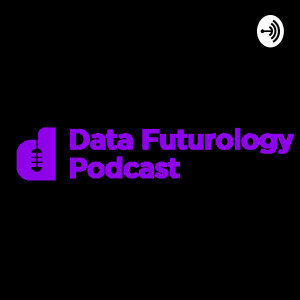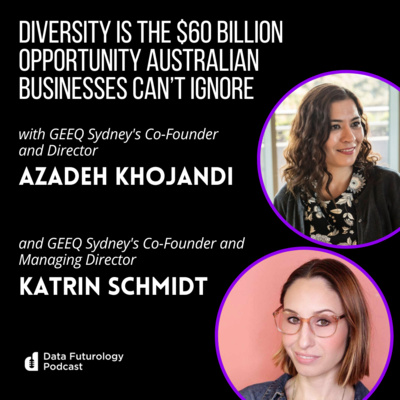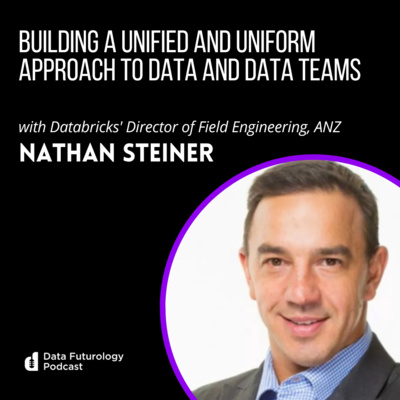

Data Futurology - Leadership And Strategy in Artificial Intelligence, Machine Learning, Data Science
https://anchor.fm:443/s/3fab060/podcast/rssEpisode List

#204 Data Is The Foundation That Makes Digital Transformation Sing With Harjot Singh, former CDO of RAC
This week we are thrilled to welcome Harjot Singh, who had been the CDO of RAC in WA until very recently. Singh is a true expert of and champion for transformation in the workplace, and has deep insights on data strategy and data governance to share. “Data drives a digital transformation in any organisation.” Singh said. “Everyone wants to jump on the bandwagon around digital transformation, but most organisations struggle to understand where to start. As Singh explains on the podcast, there is a specific order with which organisations need to approach transformation. It starts with data, which organisations should already be investing in because monetising data is one of the biggest opportunities in business. From there the data can be leveraged into machine learning and, eventually, AI. Related to this, however, Singh also mentions that organisations need to better understand the business drivers behind what they are doing with data and the digital transformation journey. “I wrote an article on LinkedIn that was around the five common mistakes to make in digital transformation,” Singh said. “If people think that digital transformation is only about technology transformation, it’s going to fail.” From there, Singh and host, Felipe Flores, discuss the impact of regulation in Australia on innovation, how companies are working within those challenges, and how various highly regulated sectors – including insurance and financial services – are finding new opportunities. Ultimately, however, as Singh says, it all comes back to data. “I say data and digital in the same sense, because I treat them as two sides of the same coin – one is incomplete without the other. Data is the bullet and digital is the gun to launch the bullet – without both you’re not going to have much of an effect.” For deep insights on the strategy and opportunity behind digital transformation, and the deep role of data in it, check out the full podcast! Enjoy the show! Join us in Melbourne for Scaling AI with MLOPS: https://www.datafuturology.com/mlops Thank you to our sponsor, Talent Insights Group! Read the full podcast episode summary here. --- Send in a voice message: https://anchor.fm/datafuturology/message

#203 Diversity Is The $60 Billion Opportunity Australian Businesses Can’t Ignore With Azadeh Khojandi, Co-Founder & Director and Katrin Schmidt, Co-Founder & Managing Director, GEEQ Sydney
GEEQ (Geeks With EQ) is a non-for-profit with an important mission: helping women get into IT and boosting the diversity of IT companies in Australia. To this day less than 20 per cent of Australia’s IT workforce are women, and this has far-reading implications, from the bias that gets built into technology itself through to the depth of innovative thinking available in the space. The two founders of GEEQ, Azadeh Khojandi and Katrin Schmidt, join us on this special podcast to discuss the work that they’re doing, and the traction that diversity is getting across Australian corporate spheres. “It’s important for us that we’re not only bringing women into the workforce, but helping them to grow and get the promotions, more responsibilities, and the fulfilment they deserve,” Khojandi says in the podcast. GEEQ is more than an advocacy group. It focuses heavily on skills and mentoring, providing women with books on leadership and managing events to assist with knowledge transfer. On the side of advocacy, the two are focused on helping the Australian business community recognise biases in the hiring process and how to mitigate against that, Katrin says on the podcast. “It’s really difficult to have awareness of your own unconscious bias,” she says. “It’s like stopping and thinking to yourself, ‘what did I just do?’. The first step is a change in awareness. You don’t have to jump to conclusions, but you do need to watch and be aware.” Azadeh and Katrin are sponsors at the upcoming Data Engineering Summit and will be hosting a luncheon. It will be a rare opportunity to talk directly to some of the speakers from the summit and discuss how to tackle the ongoing challenge of diversity. In the meantime, tune into this in-depth podcast, and hear from the experts about why diversity is a $60 billion opportunity for Australian businesses. Learn more about GEEQ: https://www.linkedin.com/company/geeq-australia/ Thank you to our sponsor, Talent Insights Group! Read the full podcast episode here.

#202 Building A Unified and Uniform Approach To Data And Data Teams With Nathan Steiner, Director of Field Engineering, ANZ, at Databricks
Later this month, Nathan Steiner, the Director of Field Engineering, ANZ, at Databricks, will give a presentation at the Data Engineering Summit. There he will talk about the “habits” of data-driven organisations, and the importance of an open architecture that combines the best elements of data lakes and data warehouses. Steiner kindly appeared on this episode of the Data Futurology podcast to talk about this, and further discuss the Databricks vision for data-driven workspaces. “Historically, you look at data engineers, data analysts, AI, machine learning and data scientists, they were focused on different types of data, so you had your data engineers focused on your siloed and disparate ADW enterprise data warehousing, relational database structured systems, and you had your data scientists looking at predominantly real time data,” he says during the wide-ranging conversation. The solution, to Steiner’s and Databricks’ vision, is bringing those data resources together and making for a more collaborative data environment. “It’s more pragmatic and effective for these job roles to be working from a single uniform platform,” he says. As Steiner notes during the conversation, the personalisation that is so important to modern business is driven from being able to make the data resources collaborative. He highlights the example of a financial services company that wants to be able to issue credit within five minutes from an application via a smartphone. “In the back end, it's AI, and ML that is doing the credit risk assessment frameworks of that particular individual and creating that value customer experience,” he says. Finally, Steiner considers the governance implications of the Databricks lakehouse, and the advantages of having a uniform and unified approach when it comes to governance. For more insights on breaking down data silos and unifying data teams, be sure to tune in to the podcast! Enjoy the show! Learn more about Databricks Learn more about Nathan Steiner Thank you to you our sponsor, Talent Insights Group! Read the full podcast episode summary here. --- Send in a voice message: https://anchor.fm/datafuturology/message

#201 Graph Databases, Deep Analytics, And Change Management: The New Data Frontiers With Peter Kokinakos, COO of MIP
Graph databases are powerful tools in analytics, but they are an often-misunderstood innovation. As they hold the relationships between data as a priority, they are an invaluable tool for modern, heavily inter-connected datasets. In this episode of Data Futurology, we explore graph databases with Peter Kokinakos (pk), the COO of MIP. They have been conceptualised for around 18 years, but it is only now that the computing power has started to catch up to allow graph database projects to come to fruition. MIP is right at the front of delivering these capabilities to their customers. “It’s becoming a real product,” Kokinakos says in the podcast. “All of a sudden we’ve got the capability of delivering these really intricate kinds of analytics for complex relationships.” Kokinakos, who will be speaking at the Advancing AI Sydney summit in August, further outlines the additional value that data scientists can get out of data relationship value in comparison to the data value. Delivering this value requires some change management to take advantage of because, as he says, “instead of just double clicking on something and drilling down the level, you can now actually drill down by the relationship.” However, once that change management process has been completed, the ability to be able to interact with customers on the basis of interconnected relationships rather than single data points is compelling. Change management is a challenge for many organisations and data scientists – anything new is always going to have some resistance. This is why MIPS runs The Data School, and Kokinakos explains in detail the value that adds to customers in the podcast as well. Tune in for an in-depth discussion into the very bleeding edge of data innovation with a company at the forefront of it. Enjoy the show! General info about the Data School Application process and deadline for the next 3 intakes: https://www.thedataschool.com.au/apply/ Learn more about MIP Thank you to you our sponsor, Talent Insights Group! Join us for one of our upcoming events: https://www.datafuturology.com/events Join our Slack Community: https://join.slack.com/t/datafuturologycircle/shared_invite/zt-z19cq4eq-ET6O49o2uySgvQWjM6a5ng Read the full podcast episode summary here. --- Send in a voice message: https://anchor.fm/datafuturology/message

#200 The Constant Evolution And Future Opportunity Of Data – with Gina Papush, former Global Chief Data & Analytics Officer at Cigna
For our milestone 200th Data Futurology podcast, we have the immense fortune of being able to host Gina Papush, the Global Chief Data & Analytics Officer of wellness and insurance company, Cigna. Papush has a long history in data science, having been involved in modelling and coding from before the time where “data scientist” was a defined role. In the years since, she has observed that enterprises have become siloed across computer science, data science, and other roles, and that the next stage of data science evolution now is to now break those silos down and find ways to bring cohesion across the organisation. She has also seen the role of the CDO and their remit evolve, from one that focused on governance and controls, to being a value creator within the organisation. Being an effective agent for change has been important to that evolution, she says on the podcast, and data executives need to look to the “blind spots” that they might have. Many have the technical skills to excel in analytics, but building skills in influence and thought leadership, and being a partner to the other stakeholders of the organisation, is the next critical step for the CDO. Finally, Papush also shares her insights on how value is extracted from data. A “one size fits all” approach cannot work, she says, and organisations need to build their strategies based on the maturity of their own data practice, rather than the hype in the market. Once the maturity is there, she says, data scientists can start looking at real life-changing innovations. “It’s (data) a huge part of how we move healthcare to be more preventive and more interactive,” she said. “Health is currently very event-driven. But analytics and AI could make it much more seamless and unlock real-time care.” Tune in to the full podcast for more of Papush’s thoughts on the history and future of data science. Thank you to you our sponsor, Talent Insights Group! Join us for one of our upcoming events: https://www.datafuturology.com/events Join our Slack Community: https://hubs.li/Q01gKNBn0 Read the full podcast episode summary here.
Create Your Podcast In Minutes
- Full-featured podcast site
- Unlimited storage and bandwidth
- Comprehensive podcast stats
- Distribute to Apple Podcasts, Spotify, and more
- Make money with your podcast












